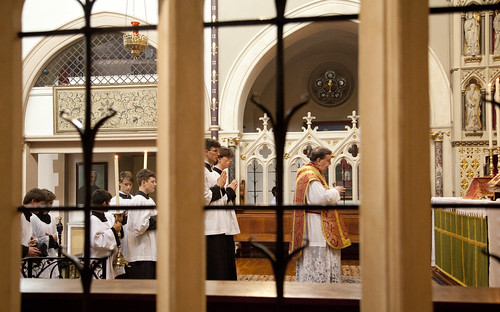 |
| The Traditional Mass behind bars: so to speak. The Oxford Oratory. |
It has become clear that the Dicastery of Divine Worship, which alone has the authority to permit priests ordained after Traditionis custodes to celebrate the Traditional Mass, is systematically refusing to do so, even though requests are coming not from individual priests, but their bishops.
What reasons are being given? I have been given sight of a letter of refusal, and I suspect the others are substantially identical.
…this Dicastery is of the opinion that this [permission] would not be an opportune decision. Therefore, we deny the request. The path established by the Holy Father in Traditionis custodes is quite clear and this has been underscored both in the “Letter to Bishops of the Whole World” which accompanied the Motu proprio and in the Responsa ad dubia of this Dicastery, which were personally approved by the Holy Father. In this latter document, with regard to this very point, it was highlighted that the liturgical reform of the Second Vatican Council “has enhanced every element of the Roman Rite and has fostered – as hoped for by the Council Fathers – the full, conscious and active participation of the entire people of God in the liturgy (cf. Sacrosanctum Concilium no. 14), the primary source of authentic Christian spirituality”. Most recently the Holy Father’s Apostolic Letter of 29 June, Desiderio Desideravi, on the liturgical formation of the people of God, expands on the above mentioned letter to the bishops and reaffirms Pope Francis’ desire that unity around the celebration of the liturgy be re-established in the whole Church of the Roman Rite (n. 61).
There is of course no difficulty for Fr [] to celebrate Mass according to the editio typica tertia (2008) of the Missale Romanum.
I wonder about that last sentence. I can't help but think that in some previous version it said at the end 'in Latin', and that this has been removed, without anyone noticing that the whole sentence is no pointless. The letter is about a priest; of course he can say the Novus Ordo!
It is noteworthy that although the letter begins by saying that the documents supporting the request have been studied carefully, the reasons for refusing the request is entirely general, not specific to the situation of the diocese.
Given that Pope Francis explicitly made provision for permissions to be given, and given that bishops requesting them presumably have good reason to do so, the attitude of the Dicastery does not seem like a straightforward application of the rules. There is something more here: something hostile to the provision which Pope Francis expected to be made 'to provide for the good of those who are rooted in the previous form of celebration.'
Is this what pastoral care looks like?
Support the Latin Mass Society
This comment has been removed by the author.
ReplyDeleteRe-final rhetorical question:
ReplyDeleteOf course not.
But it is what the church of francis (sicK) looks like
It is easy to say that "it has enhanced every element of the Roman Rite" but that does not (IMHO) equate with more Faithful attending Holy Mass - in whatever form it is celebrated. Neither does it address the unbelievable absence of new priests. It seem as if the 'powers that be' have a great fear of the Latin Mass as it shows up the many deficiencies of the Novus Ordo. Both my wife & I attend both forms of the Mass but I have to say that I get much more from my Latin Mass than from the Novus Ordo - & bear in mind that our Novus Ordo Mass is celebrated properly which, sad to say, is not always the case.
ReplyDelete"and I suspect the others are substantially identical". What reasons do we have to suspect this? This seems like quite an extreme assumption to make without any significant evidence.
ReplyDeleteWhy do you suppose that other responses may not be "substantially identical" unless you are suggesting that multiple reasons are given depending on individual queries? This would not (IMHO) make any sense as it would further obfuscate the actual situation.
DeleteThis is going to have a destructive effect on vocations.
ReplyDeleteWithout quoting the reason(s) the bishop provided in his requesting communication, it's premature to judge the response.
ReplyDeleteThis looks like a boiler-plate standard response because, as noted, it does not address any specifics of the situation in the diocese.
ReplyDelete